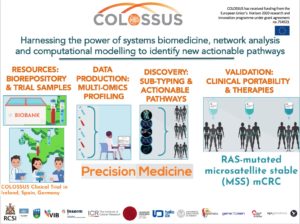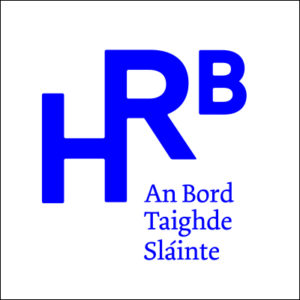
GLIOTRAIN: “Exploiting GLIOblastoma intractability to address European research TRAINing needs in translational brain tumour research, cancer systems medicine and integrative multi-omics” Horizon 2020-MSCA-ITN-2017; 2017; €3.8 million (total) – RCSI allocated €1.3 million. Co-ordinator & PI; Glioblastoma (GBM) is the most frequent, aggressive and lethal brain tumour. It has a universally fatal prognosis with 85% of patients dying within two years. New treatment options and precision medicine therapies are required. This must be achieved by multi-sectoral industry-academia collaborations in newly emerging, innovative research disciplines. The research objective of GLIOTRAIN is to identify novel therapeutic strategies for GBM, implementing NGS, systems medicine and integrative multi-omics to unravel disease resistance mechanisms. Research activities incorporate applied systems medicine, integrative multi-omics and translational cancer biology implementing clinically relevant models. The consortium brings together leading European and international academics, clinicians, private sector and not-for-profit partners across GBM fields of tumour biology, multiomics, drug development, clinical research, bioinformatics, computational modelling and systems biology. Thus, GLIOTRAIN will address currently unmet translational research and clinical needs in the GBM field by interrogating innovative therapeutic strategies and improving the mechanistic understanding of disease resistance. The ETN will train 15 innovative, creative and entrepreneurial ESRs. The GLIOTRAIN ETN addresses current needs for researchers trained in an environment that spans translational research, medicine and computational biology, and that can navigate confidently between clinical, academic and private sector environments to progress applied research findings towards improved patient outcomes.
PI and co-ordinator Prof . Annette Byrne
*********************************************************************************

Horizon 2020 – Societal challenges Personalized Medicine Call SC1-PM-02-2017; €6 million total – RCSI allocated €1.3 million Co-ordinator & PI
Advancing a Precision Medicine Paradigm in metastatic Colorectal Cancer: Systems based patient stratification solutions
Colorectal Cancer (CRC) is the third most common cancer in Europe. It is estimated that 50-55% harbour RAS mutations. Current treatment for RAS mutant (mt) metastatic (m) CRC is based on 5-fluoruracil based chemotherapy +/- bevacizumab. There are limited treatment options once cancers become resistant. Targeted treatment of microsatellite stable (MSS) RAS mt disease is difficult and has not evolved significantly in recent years. COLOSSUS will deliver novel concepts for disease-mechanism based patient stratification in MSS RAS mt mCRC to address the need for stratified or personalised therapies. The consortium will integrate multidimensional and longitudinal omics data to identify new MSS RAS mt specific subtypes. Systems bio-medicine, network analysis and computational modelling will identify new actionable pathways, biomarkers and targets across subtypes. These targets will be interrogated in pre-clinical patient derived xenograft studies. Newly described MSS RAS mt classifiers will be validated within the COLOSSUS trial. SME partners will develop clinically relevant and commercially viable assays for outcome prediction and stratification of MSS RAS mt patients based on novel classifiers. The impact of assays on CRC associated healthcare costs will be assessed. Patient associations will be included and the proposal will consider regulatory aspects and commercialization opportunities, in particular for participating SMEs.
Please see the video here for more information

PI and Co-ordinator Prof . Annette Byrne
***********************************************************************************

RCSI Seed Fund (PI) with Champions Oncology, and a Beaumont Hospital Foundation grant (PI).
Intracranial Patient Derived Xenograft cancer model systems for the development of personalised therapeutics and biomarkers;
RCSI Industry Seed Fund; 2017; €128635 total, with €109,599 allocated to Prof Byrne.
Glioblastoma (GBM) is the most frequent, and lethal of all brain tumours. 85% of patients die within two years. Moreover, up to 50% of all non-‐small cell lung cancer (NSCLC) patients (accounting for 85% of all lung cancers) develop brain metastases. The prognosis of these patients is poor with a median survival of 1 year. Thus, there exists a critical need for improved therapies in these settings. In collaboration with Champions Oncology we seek to establish for the first time within Ireland an intracranial PDX platform for interrogation of new brain tumour precision medicine therapies, predictive/ prognostic biomarkers and diagnostics, and emergence of new IP. PDX models are increasingly being used to address clinically relevant questions. Herein, we will establish 25 PDX models to guide biomarker and drug development strategies across GBM and lung cancer brain metastases (LCBM). A new imageable LCBM PDX model will deliver further IP opportunities.
***********************************************************************

- EDIREX: EurOPDX Distributed Infrastructure for Research on patient-derived cancer Xenografts; EU; Horizon 2020 – Research Infrastructure; 2017; Total Award €5 million. €170,608 allocated to RCSI – Prof Byrne. The overall goal of the EDIReX project is to establish a distributed European infrastructure for trans-national access to patient-derived cancer xenograft models and related data, for academic and industrial, preclinical and translational cancer research. Cancer is one of the major causes of death in Europe. Therefore identification, validation and optimisation of therapeutic strategies to improve survival and quality of life of cancer patients still represent a major public health challenge. Most novel therapies fail at the clinical trial stage, due to poor efficacy or to limited numbers of responding patients. Immortalised cancer cell lines cannot interrogate the complexity of human tumours and provide only determinate insights into human disease because they are limited in number and diversity, and have been cultured on plastic over decades. In this view, faithful preclinical models to reliably predict treatment efficacy and discover biomarkers are needed for optimal development of new therapeutic strategies for cancer patients. The role of RCSI in this project is to provide access to significant expertise in advanced pre-clinical imaging. Specifically, selected PDX models for which response data are known, will be implanted orthotopically and imaged (Ultrasound, PET, CT, BL). Imaging response data will be entered into the EDIReX database, which will incorporate Digital Imaging and Communications in Medicine (DICOM) standards. In this way it will be possible to compare responses assessed by imaging and calliper in simpler models, and to further compare them with images of orthotopic implants. RCSI will also participate in networking activities.https://www.europdx.eu/
- *************************************************************************

- The ColoForetell project has identified as a primary goal, the discovery & verification of predictive pharmaco-omic & imaging methods for regorafenib in mCRC patients who have disease progression despite all currently available standard therapies.
Within the current context, a state of the art mCRC Patient Derived Xenograft (PDX) platform will be rolled out at RCSI to enable the systematic and integrated interrogation of predictive ‘omic and imaging markers of intrinsic resistance to regorafenib. Emergent pre-clinical biomarker data will be cross-validated with biomarker candidates arising from genomic biomarker discovery studies implementing ‘CORRECT’ Trial primary tumour biopsy samples (work to be undertaken by industry collaborators at Bayer Healthcare Pharmaceuticals). Data will be integrated and analysed using conventional statistics and where appropriate, systems modeling approaches. Our ultimate goal is the emergence of integrated prognostic tools for the early prediction of patient outcome following REG treatment. The Coloforetell initiative seeks to exploit a multi-dimensional modular strategy towards the focused identification of efficacy biomarkers, to predict patient response to REG therapy in mCRC where response rate heterogeneity has been confirmed. This integrative approach expands on the integrative paradigm employed in the multi-million Euro EU funded ‘ANGIOPREDICT’ initiative (which is co-ordinated by the Applicant) to employ mCRC PDX modelling and molecular imaging as state of the art tools in pre-clinical biomarker identification

Title: A new cell free DNA liquid biopsy assay to predict bevacizumab outcome in metastatic colorectal cancer patients
lead PI- Prof Annette Byrne
co-PIs : Prof Diether Lambrechts (VIB) and Prof Darran O’Connor (RCSI) are co-applicants